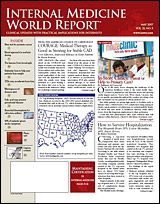Publication
Article
Internal Medicine World Report
AHA Discourages Cox-2 Inhibitor use for Patients With CV Risk Factors
Author(s):
The controversy over the selective cyclooxygenase (COX)-2 inhibitors continues, as experts debate the risks and benefits of these agents, and physicians wonder whether to prescribe them for chronic pain, despite strong evidence linking them to cardiovascular (CV) risk and the potential for serious adverse effects. Now the American Heart Association (AHA) has issued a statement telling physicians to avoid prescribing the COX-2 inhibitors in patients with a history of CV disease or in those at risk for CV complications (Circulation. 2007; 115:1634-1642).
“We believe that some physicians have been prescribing the new COX-2 inhibitors as the first line of treatment,” said lead author Elliott Antman, MD, FACC, professor of medicine at the Harvard Medical School and director of the Coronary Care Unit at Brigham and Women’s Hospital. “We are turning that around and saying that, for chronic pain in patients with known heart disease or who are at risk for heart disease, these drugs should be the last line of treatment.”
The COX-2 inhibitors have come under increased scrutiny since rofecoxib (Vioxx) was removed from the market more than 2 years ago because of increased risk for myocardial infarction (MI) and stroke. Studies published since then have reinforced concerns about CV risks with the selective COX-2 inhibitors and even with the nonselective nonsteroidal antiinflammatory drugs (NSAIDs), thus raising concerns about these medications as well.
The second COX-2 inhibitor, valdecoxib (Bextra), was removed from the market a few months later, and the FDA has recently demanded the addition of a boxed warning to all available prescription NSAIDs.
The agency has also asked manufacturers of nonprescription NSAIDs to revise their labeling to include more direct information about potential CV and gastrointestinal (GI) risks and provide information that will help patients use the drugs safely.
In April 2007, the FDA’s arthritis advisory committee voted against recommending approval of a new COX-2 inhibitor, etoricoxib (Arcoxia; Merck), because of the lingering concerns for CV risks with this class.
The COX-2 Problem
The new AHA statement notes that COX-2 is expressed in normal endothelial cells in response to shear stress and that inhibition of COX-2 is associated with inhibition of prostacyclin synthesis. The CV consequences of inhibiting the COX-2 enzyme include a shift in the coagulation factor balance toward thrombosis, increased sodium and water retention, exacerbations of heart failure and hypertension, and loss of the protective effects of COX-2 upregulation in the setting of myocardial ischemia and infarction.
The statement includes findings from a recent meta-analysis (BMJ. 2006;332: 1302-1308), which found that, compared with placebo, selective COX-2 inhibitors were associated with an 86% greater risk of MI and a 42% greater risk of serious vascular events. No significant association was found between the use of COX-2 inhibitors and the risk of stroke.
Chronic Pain Therapy
The AHA advocates a stepped-care approach to the management of patients with musculoskeletal symptoms (Figure), beginning with analysis of symptom etiology and use of physical therapy, heat/cold, and other nonpharmacologic approaches.
Initial drug therapy for patients whose symptoms are not adequately controlled with nonpharmacologic measures include acetaminophen, aspirin, tramadol, nonacetylated salicylates, and short-term narcotic analgesic therapy.
If these prove ineffective, consider using NSAIDs. For patients in whom NSAID therapy is indicated, the AHA recommends trying non–COX-2 selective NSAIDs first, followed by NSAIDs with some COX-2 activity, and finally, COX-2-selective NSAIDs.
Relative selectivity for COX inhibition has important implications for the likelihood of CV or GI adverse events with NSAIDs, the report notes. Increasing degrees of selectivity for COX-2 are associated with an increased risk for CV events, while increasing degrees of selectivity for COX-1 are associated with greater GI toxicity.
Patients using aspirin for cardioprotection may also use NSAIDs or selective COX-2 inhibitors for pain relief, but ibuprofen may dampen the protective effect of aspirin against atherothrombotic events. Thus ibuprofen should be taken at least 8 hours before or 30 minutes after taking aspirin to avoid any potential interaction.





